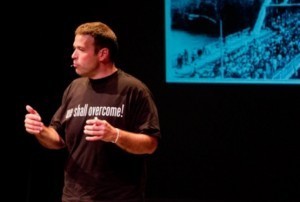Donald Miller's Blog, page 123
March 22, 2011
What Does the Voice of Jesus Sound Like?
In John chapter ten Jesus calls Himself the Good Shepherd. To those listening, His language is vague. They want to know who is right and who is wrong, who gets into heaven and who doesn't, and they want to be able to measure the metrics. Jesus doesn't really give them anything they can use to judge that sort of thing, at least not in this chapter (elsewhere, He says if you love me you will obey me). But here, Jesus simply says that He is the Good Shepherd, and the sheep will know His voice.
 Not only does Jesus say the sheep will know His voice, but He says He knows them, too. He even says He knows their names. The picture is intimate, guiding, loving and protective. Jesus talks about the enemy of the sheep, the previous guys who didn't own the sheep but were put in charge of them, and how somebody who doesn't own the sheep will flee whenever a wolf comes around. But Jesus implies He will not flee, because He loves the sheep.
Not only does Jesus say the sheep will know His voice, but He says He knows them, too. He even says He knows their names. The picture is intimate, guiding, loving and protective. Jesus talks about the enemy of the sheep, the previous guys who didn't own the sheep but were put in charge of them, and how somebody who doesn't own the sheep will flee whenever a wolf comes around. But Jesus implies He will not flee, because He loves the sheep.
So how do we know if we are hearing Jesus voice? Well, at this point we can only conjecture, but I think the conjecture is safe. As we read through the gospel of John, for instance, do we find ourselves sensing there is something special about Jesus? Do we find ourselves curious enough to want to keep following Him, even though we don't know exactly what that means? Are we hopeful that we can set down all our religious checklists that gave us security (an an insatiable desire for more security, like an addiction) in exchange for a person, the person of Jesus? Do other religions or philosophies (perhaps even what we previously thought of as Christianity, or some mechanical version of Christianity) feel like dead ideas while Jesus seems to be living and breathing and in our midst? Then I'd be willing to say you are one of His sheep. After all, He did say that you would hear his voice.
And when we are one of His sheep, Jesus says we will find rest. He says in John chapter ten we will be saved and go out and find pasture. Sounds pretty good, doesn't it?
Not only this, but as we trust Jesus we begin to realize He knows us, personally. He is not like the faith of dead ideas we previously subscribed to, but He is living and breathing and interacting with us. We feel like the Apostles, scurrying behind Him asking silly questions. And it's comforting to know that He loves us and knows us, even as He and the Father love each other and know each other, which is the kind of love He describes in the same chapter.
Tomorrow, I want to look at a group of people who Jesus stated clearly were not in His flock. It's sobering stuff.
What Does the Voice of Jesus Sound Like? is a post from: Donald Miller's Blog
March 21, 2011
How not to Read the Bible
 I almost made a mistake the other day of opening the Bible with an agenda. I'd had an idea about a certain "Biblical principal" and I wanted to check a text to see if I was right. Then I realized that's a slippery slope. There's not a lot you can't use the Bible to support. And besides that, if the Bible is designed to be a constitution, it's horribly organized. I had to put myself in check.
I almost made a mistake the other day of opening the Bible with an agenda. I'd had an idea about a certain "Biblical principal" and I wanted to check a text to see if I was right. Then I realized that's a slippery slope. There's not a lot you can't use the Bible to support. And besides that, if the Bible is designed to be a constitution, it's horribly organized. I had to put myself in check.
This isn't an easy thing to do. If you go to the Bible without a preconceived grid through which you interpret it's meaning, you may in fact find out that your pre-concieved grid isn't as concrete as you thought, and you may then have to admit that you're wrong. I wonder if our grids aren't so solid for this reason, rather than as supposed guardrails to keep us from straying from the truth.
I've a friend who reads the Bible not to look for right ideas but to look for something to do. Literally, he opens the Bible, and reads till he sees something that he can take action on, whether it's loving as friend or confronting a bad guy or bringing some food to somebody who is hungry. He said he got tired of always parsing ideas and wanted some action. He's one of the most exciting people I know.
If I were the devil, and I'm hoping I'm not, I'd just try to get people to use the Bible to argue about ideas rather than do anything.
How not to Read the Bible is a post from: Donald Miller's Blog
March 20, 2011
Sunday Morning Music, The Tallest Man on Earth
Heard him on a late-night PBS show a couple nights back. I'd seen the posters around town. Good stuff. This morning, enjoy Tallest Man on Earth:
Sunday Morning Music, The Tallest Man on Earth is a post from: Donald Miller's Blog
Sunday Morning Music, The Tallest Man in the World
Heard him on a late-night PBS show a couple nights back. I'd seen the posters around town. Good stuff. This morning, enjoy Tallest Man on Earth:
Sunday Morning Music, The Tallest Man in the World is a post from: Donald Miller's Blog
March 18, 2011
Is Your Life Confusing?
In his book The Tipping Point, Malcolm Gladwell references a study done by the people who created Sesame Street in which children were observed as they watched the show to see when they turned their heads and lost interest. The study showed children lost interest in the show, not when there wasn't something exciting happening on screen, or there were boring characters, but when they didn't understand what was happening. In other words, if they did not understand the story, even if it were a mini story of bringing two halves of a word together, they lost interest and started playing with toys.
 Producers tried to remedy the lack of interest by ratcheting up conflict, but this didn't work. Conflict without a story is still confusing. Interesting characters without a story are confusing as well. The producers at Sesame Street worked hard, then, to make every scene, every segment a very clear story, and because of their work retain the average child's engagement an unheard of 80% of the time they are watching the show.
Producers tried to remedy the lack of interest by ratcheting up conflict, but this didn't work. Conflict without a story is still confusing. Interesting characters without a story are confusing as well. The producers at Sesame Street worked hard, then, to make every scene, every segment a very clear story, and because of their work retain the average child's engagement an unheard of 80% of the time they are watching the show.
I reread The Tipping Point recently and wondered about how this study relates to our own lives. I posit that we all do the same thing, not with television, but in life. That is, we check out when we don't understand what is going on. We distract ourselves. Or, worse, we ratchet up the conflict or numb ourselves with entertainment.
Let me ask you this: What if your own life was so engaging that entertainment seemed boring? I mean what if you were involved in projects that so captivated you that turning on the television would be a distraction from your real life? Can you imagine such a possibility?
The elements of a meaningful story are the same as the elements of a meaningful life:
1. A character.
2. That knows what they want.
3. And is willing to overcome conflict.
4. To get it.
Do you know exactly what you want and why? And do you appreciate or bemoan the conflict you endure? Is your story more interesting to you than television? Is all of life boring or is just your life boring? Do you believe you can make changes that will make your life more interesting? I do.
If you want to know more, come on out to Portland for the Storyline Conference in June. You'll leave, I hope, with a better understanding of the elements of a meaningful life.
For now, though, maybe you could take out a notebook and write down everything you want in life. If the list looks boring, your life will be boring. So make a second list. What would you want that perhaps would be more engaging, and perhaps even more risky?
Now turn the page in the notebook and write down all the conflict you might endure trying to get what you want? What could happen? What are you afraid of?
Now reread the list of things you want to accomplish, and all the conflict you might endure trying to get it.
If you feel like living a more meaningful story, then go for it. If not, there's always television. I hear Sesame Street is interesting.
Related (not sponsored links):
A Million Miles in a Thousand Years
Is Your Life Confusing? is a post from: Donald Miller's Blog
March 17, 2011
Happy St. Patricks Day
 Saint Patrick, for whom todays Catholic holiday is named, was not born Irish. His parents were Romano-British and deacons at the local church. At sixteen Patrick was kidnapped by Irish raiders and taken to Ireland as a slave. He escaped his captives, snuck aboard a ship and made his way back to Britain. When he returned to Britain he studied to be a priest, after which he decided to return to Ireland to preach the gospel to what was then a polytheistic culture.
Saint Patrick, for whom todays Catholic holiday is named, was not born Irish. His parents were Romano-British and deacons at the local church. At sixteen Patrick was kidnapped by Irish raiders and taken to Ireland as a slave. He escaped his captives, snuck aboard a ship and made his way back to Britain. When he returned to Britain he studied to be a priest, after which he decided to return to Ireland to preach the gospel to what was then a polytheistic culture.
Saint Patrick was said to have used the shamrock to explain to the Irish people the doctrine of the Trinity. He spent thirty more years in Ireland and died on the 17th of March, 461. He is considered the principal missionary from Rome to the Irish and is celebrated as such on this day.
Today Saint Patricks day is celebrated around the world as a sort of tribute to the Irish and the culture of Ireland, a relatively small Island with a storied past and perhaps more storied characters within. It is, of course, widely known for its association with the drinking of beer. Saint Patricks day is the day in which the most alcohol is consumed by Americans. You can just see Saint Patrick now, can't you, wandering into an American bar well after midnight, laying down on the floor next to a passed out college student, pointing at the paper shamrocks stapled to the ceiling, and explaining how much the Father loves the Son, and the Son loves the Father, and how the Holy Ghost is with us always, even on the floor of a pub.
Happy St. Patricks Day is a post from: Donald Miller's Blog
March 16, 2011
Jesus Contends with Religion
Matthew is a book written for a Jewish audience. Jesus makes multiple references to Himself as the one prophesied, and even talks about being held up, as Moses held up a serpeant that became a rod. Matthew is intentionally hilighting the parts of Jesus life and teaching that will make it easier for the Jews to understand and have faith He is the Son of God.
 That said, Jesus pulls no punches in calling the Jews on their own self deception. They are a people steeped in religious tradition. They go to temple. They observe the sacred holidays. They perform rituals. It would be very difficult to then transfer a sense of security based in sacrifice and action to a security based in faith, even if the man making the request was performing miracles.
That said, Jesus pulls no punches in calling the Jews on their own self deception. They are a people steeped in religious tradition. They go to temple. They observe the sacred holidays. They perform rituals. It would be very difficult to then transfer a sense of security based in sacrifice and action to a security based in faith, even if the man making the request was performing miracles.
As Christians, we are, of course, not Jews, we do not slaughter animals or perform rituals. Our faith, supposedly, is in Christ. And yet we have developed our own sense of security outside of Christ that we call church or christianity or Bible study or discipleship. There is, of course, nothing wrong with this, but it's hardly the source of our security. Our security is in Christ and Christ alone.
Imagine counseling a married couple and noticing that the man does everything he is supposed to do. He provides, he takes out the garbage, he writes loving notes, he spends time. The woman's complaint, then, is not that he doesn't do the right things, its that he doesnt mean any of it. He is doing these things because he gets a sense of security and even satisfaction in having a perfect marriage. Perhaps his little community at the church is in a kind of subconscious contest to see who can have the best marriage. What's missing is a genuine love for his wife.
This woman would gladly take a changed husband who even forgets to take out the garbage and doesn't often leave notes but has that intangible quality that we could only call a loving heart. The doing is nice, but it's the genuine authentic reality of the love that is the point.
The great crisis of the church goer is that his action does not save him. He must base his faith on someone outside his control. He cannot make Christ redeem him, or manipulate Christ into redeeming him. He cannot trick Christ or impress Christ into giving him what he wants. He can only trust Christ. And this is a frightening reality.
Our Christian devotion can put us in a crazy dynamic. Of course we are devoted to Christ because we go to church. Of course we are devoted to Christ because we give our money to the church. Of course we are devoted to Christ because we read the Bible. And if we are devoted to Christ, some of these things will sometimes be true. Love does. But the dilemma is this: Attempts to control do the same things that love does, without the love.
So let me ask you this. If you stopped going to church for years, and never picked up your Bible again, would you still believe your eternal security rested in the good and gracious heart of Christ, despite your lack of ritual? If not, then part of your security is based in religion, and it's a false security.
Near the end of Matthew 8, Jesus says to the Jews "If God were your Father, you would love me, for I came from God and I am here. I came not of my own accord, but he sent me. Why do you not understand what I say? It is because you cannot bear to hear my word. You are of your father the devil, and your will is to do your father's desires. He was a murderer from the beginning, and has nothing to do with the truth, because there is no truth in him. When he lies, he speaks out of his own character, for he is a liar and the father of lies."
The remarkable and alarming context of this passage has Jesus talking to the Jews, who were referencing their Father Abraham, and were getting their security from Him. Jesus here is not talking about Abraham, of course, because he said earlier "If Abraham was your Father you would love me." He's referencing Satan. He is saying that your sense of security is a lie, and your religious devotion, which is your way of controlling your own sense of security through your own actions, is of the devil.
Jesus Contends with Religion is a post from: Donald Miller's Blog
March 15, 2011
It's Better to Relay Information than Teach our Own Philosophies
 As a guy who writes books and teaches for a living, I've definitely got some ideas. But reading this morning in John 7, I was brought back to the truth that, well, what I've got to teach really isn't that important. What I need to do is relay information that has existed for centuries, truths that existed even before there were centuries.
As a guy who writes books and teaches for a living, I've definitely got some ideas. But reading this morning in John 7, I was brought back to the truth that, well, what I've got to teach really isn't that important. What I need to do is relay information that has existed for centuries, truths that existed even before there were centuries.
In John 7:14, Jesus, goes to the temple and begins to teach. And apparently he knew what he was talking about. People remarked at how learned he was, even though he wasn't a student. Of course what he was teaching was that he, in flesh and bone, was the fulfillment of the prophesies in the ancient text. The prophesies had told of a coming Messiah. The Jews, of course, rejected him because he didn't look the part (He wasn't like the image they had built up in their imagination) but none the less, he knew the text inside and out (most of the people who knew the text inside and out rejected him, so that's not praise for knowing the text).
Jesus says of his teaching "My teaching is not mine, but his who sent me." And I find myself wondering about how great it must be, how much it takes the pressure off, to simply relay information rather than to invent teachings. What I have to teach simply isn't that important and may in fact lack eternal meaning.
To be sure, Jesus would not have a problem with teaching math or advancing cancer research. This is not a statement about whether or not we should teach. But it is a true characteristic of Jesus that he was always going about the fathers will, teaching his fathers truths and I think there is a lesson in there for us.
My mind goes back a few chapters to John the Baptist who said "I am not the light but came to bear witness to the light."
Jesus did not teach in the realm of math or cancer research, but he did teach in the realm of "what's wrong with my soul and how do I make it better" and to this end, our teachings lack meaning in compared to the teachings of Jesus, namely he was the son of God and we will be healed mysteriously in a relationship with him, betrothed now, and united in heaven.
It's Better to Relay Information than Teach our Own Philosophies is a post from: Donald Miller's Blog
March 11, 2011
Jesus Wants us to use Common Sense
In John 7, Jesus decides to go to Galilee and avoid Judea because the Jews in Judea were hatching a plan to kill Him. I often turn my faith into voodoo like seances and emotion-filled prayers in seeking God's will, while Jesus Himself just uses common sense. I'm not going to Judea, He says, because those guys are trying to kill me. I'll go over to Galilee instead. I hear they have a Dairy Queen.
 I remember reading a big report from a church I used to go to, a vision statement outlining the plan for the church to grow. It involved buying new property and building a new building and more than quadrupling the size of the congregation over the next twenty years or so. When I read it, I remember thinking that the vision lacked common sense. The church was in a rural area, and there was no growth happening in the community. It seemed like, if you wanted to reach more people, you'd just send another pastor into an area closer to town and plant another church. It would be a lot cheaper to do it that way anyway. But the vision was couched in a lot of God talk, a lot of talk about how it was "bathed in prayer" and the sort of language that creeps normal people out. That vision statement came out ten years ago, and very little has happened, save a church split and a lot of controversy.
I remember reading a big report from a church I used to go to, a vision statement outlining the plan for the church to grow. It involved buying new property and building a new building and more than quadrupling the size of the congregation over the next twenty years or so. When I read it, I remember thinking that the vision lacked common sense. The church was in a rural area, and there was no growth happening in the community. It seemed like, if you wanted to reach more people, you'd just send another pastor into an area closer to town and plant another church. It would be a lot cheaper to do it that way anyway. But the vision was couched in a lot of God talk, a lot of talk about how it was "bathed in prayer" and the sort of language that creeps normal people out. That vision statement came out ten years ago, and very little has happened, save a church split and a lot of controversy.
I find it suspect when a vision for power and glory for man is couched in a lot of religious talk. I usually suspect that its one of two things, if not both:
1. Justification for doing something we really want and God didn't ask for.
2. A way of defending what we want so nobody will argue with us or push back. How can they? We prayed about it and stuff.
Miracles happen and people get visions for sure. But mostly God gives us a hoe and some seeds and introduces us to the miracle of work and a lot of common sense.
Jesus Wants us to use Common Sense is a post from: Donald Miller's Blog
March 10, 2011
We Do Not Receive Glory From People
Jesus said "I do not receive glory from people. I know that you do not have the love of God within you."
If there was ever a statement that invited trust, it's this one. In a sense, Jesus is saying "I don't need you to affirm me. I'm not looking to you for any kind of completion. Your association or disassociation do not affect me." And from there He tells the truth about our condition, and the more wonderful truth about His grace and our own forgotten worth.
 As creators, when we seek glory from people, we drink from a poisonous well. We can get love from other people, for sure. But love and glory are different. Love from our friends comforts, but glory, that is the love of God that will be poured through our souls upon our reunion, is what we are really looking for. If a child is not loved, the child will likely feel a wound for life. Love is that important. But God's glory is what love speaks of only in metaphor.
As creators, when we seek glory from people, we drink from a poisonous well. We can get love from other people, for sure. But love and glory are different. Love from our friends comforts, but glory, that is the love of God that will be poured through our souls upon our reunion, is what we are really looking for. If a child is not loved, the child will likely feel a wound for life. Love is that important. But God's glory is what love speaks of only in metaphor.
As a creator, we are better off pointing people toward glory than seeking glory ourselves. If you've got a gallery opening coming up, it's going to be a miserable experience if you are hoping for glory. If you are hoping for love, have a ball, I hope people show up and affirm your work and your art. But lets be careful about the glory part. People are human and flawed, and they cannot give you glory like the presence of God.
So what do we do to get the glory?
You wait. And you love each other to comfort each other while you are waiting.
May your work point to the glory that "will be" revealed.
We Do Not Receive Glory From People is a post from: Donald Miller's Blog
Donald Miller's Blog
- Donald Miller's profile
- 2745 followers



